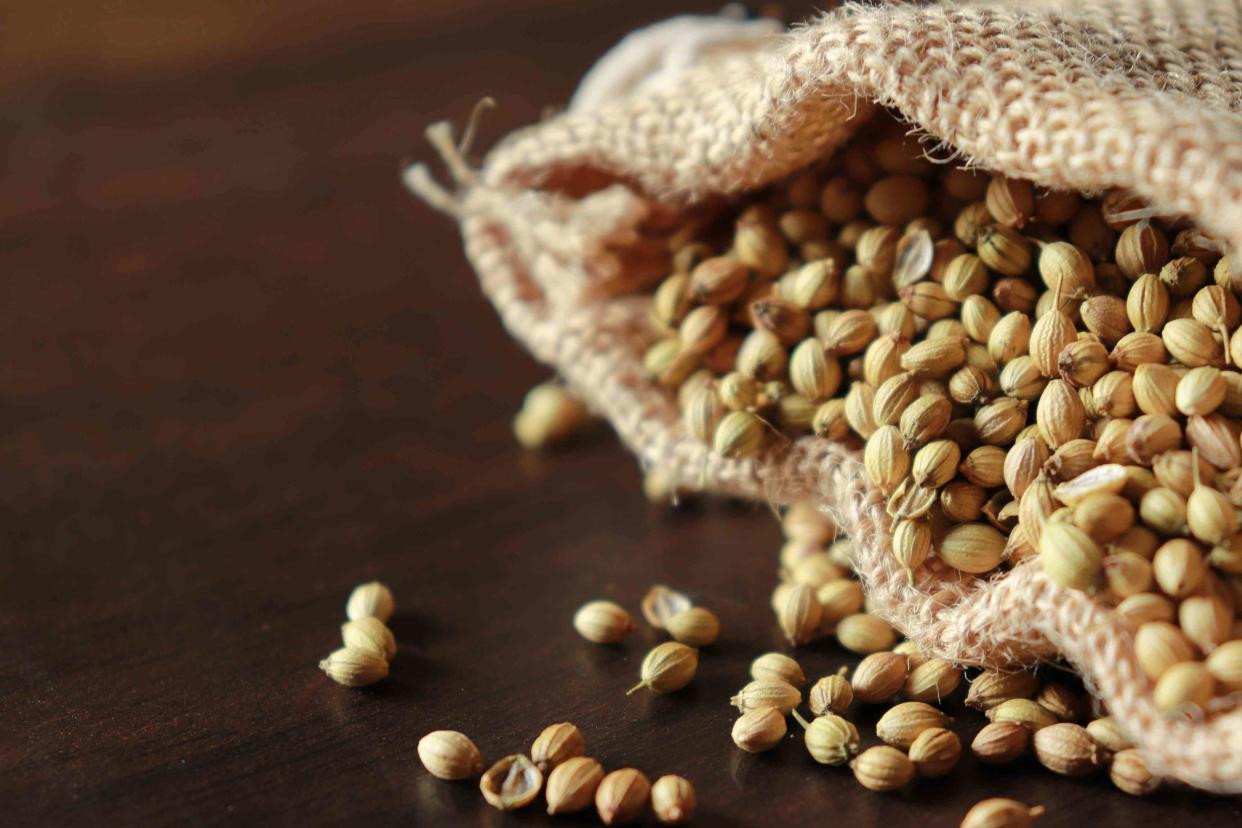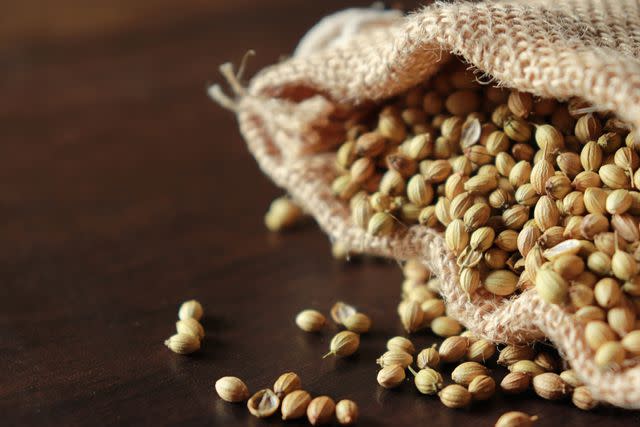Everything You Need to Know About Coriander

Veena Nair / Getty Images
Medically reviewed by Elizabeth Barnes, RDN
Coriander (Coriandrum sativum) is an herbaceous plant believed to have originated in the Mediterranean and regions of the Middle East. It is part of the Apiaceae (carrot) family and is used in traditional medicine and as a spice in cooking.
Many parts of the coriander plant are used for medicinal or culinary purposes. For example, the leaves and/or seeds may be ground or used in whole form in cooking. In some parts of the world, coriander is referred to as cilantro.
Typically, coriander seeds are used for their potential health benefits. In the United States and other places, "coriander" refers to the seeds rather than the plant. However, other parts of the plant are sometimes used as medicine.
This article discusses the uses of coriander and the evidence behind them. It also covers side effects, precautions, interactions, and how much coriander to use.
Dietary supplements are not regulated the way drugs are in the United States, meaning the Food and Drug Administration (FDA) does not approve them for safety and effectiveness before products are marketed. When possible, choose a supplement tested by a trusted third party, such as U.S. Pharmacopeia (USP), ConsumerLab.com, or NSF International.
However, even if supplements are third-party tested, they are not necessarily safe for all or effective in general. Therefore, it is important to talk to your healthcare provider about any supplements you plan to take and ask about potential interactions with other supplements or medications you take.

Veena Nair / Getty Images
Active ingredient(s): Linalool, camphor, alpha-pinene, gamma-terpinene, geranyl acetate
Alternate name(s): Coriandrum sativum, Chinese parsley, cilantro
Legal status: Sold over the counter in the United States
Suggested dose: Due to a lack of scientific evidence, there is no suggested dose for coriander.
Safety considerations: Side effects are rare but may include allergic reactions, photosensitivity, contact dermatitis, and upset stomach.
Uses of Coriander
Supplement use should be individualized and vetted by a healthcare professional, such as a registered dietitian, pharmacist, or healthcare provider. No supplement is intended to treat, cure, or prevent disease.
Linalool, a substance found to provide health benefits, is thought to be the main bioactive ingredient in coriander. Research suggests that linalool may be antimicrobial, anticancer, anxiolytic (anxiety-reducing), and an antioxidant.
Substantial research on coriander is lacking to prove these effects will occur in humans. Most studies have been performed on animals (in vivo) or in lab settings (in vitro).
Regardless, interest in coriander for its potential health benefits remains. An overview of some of the research follows.
Antioxidant Properties
Coriander contains several antioxidants. Antioxidants help fight free radicals, which are unstable molecules that can damage cells in the body. Antioxidants can help with immune health and inflammation, as well as having neuroprotective effects. However, much of this research has been performed in test-tube and animal studies, and human data is lacking.
Heart Health
Coriander leaves have been found to contain flavonoids, essential phytochemicals that act as antioxidants. According to one review, the flavonoids in coriander inhibit the angiotensin-converting enzyme (ACE), leading to more relaxed arteries and, as a result, lowered blood pressure.
As promising as these results are, human research on coriander for high blood pressure (hypertension) is severely lacking. More research is needed in this area.
Coriander is widely used in traditional medicine for anxiety. Preliminary research has shown coriander to have antianxiety effects. It may work by modulating negative emotions that arise from the brain.
Yet, human trials need to be conducted to confirm coriander's role in treating anxiety before it can be recommended.
Skin Protection
Lab research has revealed that coriander increases the production of procollagen type 1, a precursor to collagen, which is the most abundant protein in human skin. In the study, coriander was also shown to thicken the dermal layer of the skin and prevent free radicals often present in sun-damaged skin.
In another study, coriander essential oil showed the most potential for treating sun damage compared to other essential oils. Researchers found that coriander inhibited various enzymes that may lead to photoaging (cumulative sun damage that prematurely ages the skin). Linalool was thought to be the main component responsible for these effects.
Once again, though, additional studies should be conducted before coriander can be recommended to treat sun-damaged skin.
Side Effects of Coriander
In general, coriander is thought to be safe, especially when used as a spice or in normal amounts used in foods. In fact, the FDA has recognized coriander as "generally recognized as safe" (GRAS).
Many studies have reported few to no side effects or adverse events associated with using coriander.
However, recall that most of the available coriander studies have been performed on animal models or in lab settings rather than on humans, which means the full extent of possible side effects in humans are unknown.
A few side effects have been reported for coriander. These include:
Allergic reaction
Photosensitivity (sensitivity to sunlight)
Contact dermatitis (itchy rash caused by coming into contact with an irritant or allergen)
Upset stomach
Side effects may be more likely to occur if you take too much coriander, so it's important to only use the herb as directed.
Precautions
Coriander is considered safe for most people, but some may need to limit or avoid using it.
Although rare, it is possible to be allergic to coriander. Anyone with a known allergy or allergy to other plants of the Apiaceae family should avoid using coriander.
There isn't enough scientific evidence on coriander to know whether it is safe for people who are pregnant or breastfeeding. Avoid using coriander in large amounts, such as in a supplement, if pregnant or breastfeeding.
While foods containing coriander generally are safe, coriander supplements' effects on young children are unknown. For this reason, it's best to avoid giving coriander supplements to young children.
Additional precautions may exist, but research is limited on coriander. Talk with a healthcare provider before using coriander supplements, especially if you have any medical conditions or take prescription medications.
Dosage: How Much Coriander Should I Consume?
Always speak with a healthcare provider before taking any supplement to ensure that the supplement and dosage are appropriate for your individual needs.
Coriander has not been approved as a treatment for any medical condition.
Because many of the studies on coriander have been performed on animals or in labs, it's difficult to make dosage recommendations for humans. More reliable data are needed.
Adding Coriander Into Your Diet
Various parts of the coriander plant may be used to season food. Coriander leaves and seeds are typically used, and these are typically ground or whole for cooking. Coriander is also sometimes used as a food preservative.
Ground coriander is thought to be best for adding flavor to foods, while whole coriander seeds or leaves may be used to add both flavor and texture to a dish.
Coriander is used in both sweet and savory recipes. This may be due to its flavor, which is said to be earthy, citrusy, and somewhat sweet.
Besides adding coriander to cooked foods, some people enjoy sprinkling it on soups, salads, or smoothies.
Interactions
Coriander may interact with certain medications, supplements, and other herbs. If you take any medications or use other supplements or herbs, be sure to talk with a healthcare provider before using coriander.
Some preliminary research has found coriander to have a sedative effect similar to Valium (diazepam). For this reason, it is thought that taking coriander with other sedatives may cause increased drowsiness.
Because of coriander's potential to lower blood sugar, it may not be safe to take along with other medications used to lower blood sugar.
Likewise, coriander may need to be avoided by anyone taking medications to lower blood pressure. This is because coriander may have an additive effect, causing a too-low blood pressure.
It's important to note that these and other potential coriander interactions are not well-documented. Reports of official interactions are limited.
Always carefully read the ingredients list and nutrition facts panel of a supplement to know which ingredients and how much of each ingredient is included. You should review supplement labels with a healthcare provider to discuss any potential interactions with foods, other supplements, and medications you take.
How to Store Coriander
Ground coriander spice, coriander seeds, and coriander supplements should be stored in a cool, dry place. They should also be kept out of direct sunlight.
Fresh coriander leaves (cilantro) should be stored in the refrigerator for optimal freshness. Some people recommend loosely covering coriander leaves with a plastic bag or storing them in an air-tight container.
Discard coriander once its expiration date passes or it loses freshness.
Sources & What to Look For
Coriander seeds, ground coriander, and fresh coriander can be purchased in most grocery stores. You can also find ground coriander and coriander seeds online.
Ground coriander is typically sold in small bottles (similar to other spices). However, it can also be found in larger bags for those who use it regularly. Coriander seeds are also sold this way.
Coriander supplements can be purchased online or in some specialty stores. They are mostly available in capsule form, but extracts and powders are also available.
Coriander is naturally vegan and gluten-free. Some products are also organic.
While spices are regulated by the FDA, dietary supplements are not. To avoid products that have been contaminated or have false information on the nutrition label, look for coriander supplements that a third-party agency, such as ConsumerLab.com, NSF International, and USP, has approved. A seal from these or other agencies can provide peace of mind.
Similar Herbs and Spices
If you don't have coriander or if you don't like the taste, other herbs and spices may act as a replacement due to their similar qualities.
Herbs and spices most often compared to coriander include:
Cumin
Caraway
Curry powder
Fennel
Basil
Dill
Tarragon
Parsley
These provide similar flavor profiles and uses in cooking as coriander. Some of these similar herbs and spices may also provide similar health benefits.
Cumin contains flavonoids and terpenes, two antioxidants that are thought to reduce free radicals and oxidative stress in the body.
Caraway is used in traditional medicine to treat digestive issues and increase breast milk supply. Fennel has been used similarly and is thought to be beneficial due to the presence of phenolic compounds, flavonoids, fatty acids, and amino acids.
Summary
Coriander (Coriandrum sativum) is an herbaceous plant native to the Mediterranean and Middle East regions of the world.
Coriander is typically used as a spice to flavor food, but some people use it for its potential health benefits, most of which are not supported by scientific evidence.
For the most part, coriander is considered safe, and using it comes with few risks. But it may not be right for everyone.
Talk with a healthcare provider if you're considering using coriander as a dietary supplement.
Frequently Asked Questions
What does coriander taste like?
Coriander is said to have a distinctive flavor and smell that is strong enough to mask the taste of certain foods, like fish.
Coriander's scent is described as sweet, aromatic, and spicy. Yet, its flavor may be described differently from one person to the next. To some, coriander tastes citrusy and fresh, while others find the flavor nutty and earthy.
What are the different types of coriander?
There are two types of Coriandrum sativum (C. sativum): C. sativum vulgare and C. sativum microcarpum. Both varieties of the herb are similar but have different phenolic compound profiles. Typically, C. sativum microcarpum has a higher essential oil yield than C. sativum vulgare.
What is the difference between coriander and cilantro?
Coriander and cilantro both come from the coriander plant.
The major difference between the two is simply the part of the plant they're from: Coriander comes from the seeds and cilantro comes from the leaves. Interestingly, some people refer to all parts of the coriander plant as "coriander" while others call the plant "cilantro."

